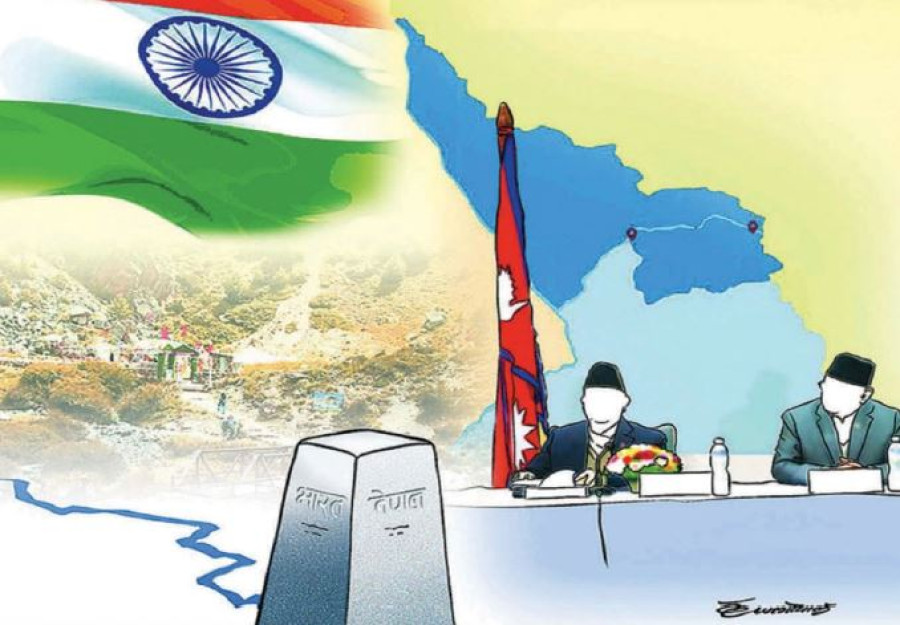National
Boundary study panel to submit report this month
Report likely to recommend that Nepal government refrain from internationalising the border dispute with India before formal talks take place.
Anil Giri
A team of experts commissioned by the government to collect evidence, historic facts, and documents to support Nepal’s claim to the disputed territories of Kalapani, Lipulekh and Limpiyadhura, is to submit its report within this month.
Although the members of the nine-member committee, commissioned in June, are tight-lipped about the report, the team is going to provide the government a range of documents from the Anglo-Gurkha War (1814-1816) to the most recent boundary negotiations that support Nepal’s claim over land east of the Kali, the Post has learnt.
The committee is also likely to urge the government not to internationalise the boundary dispute with India as it will only complicate the issue.
“As per the code of conduct, I can’t divulge any details of the report to the media,” said Bishnu Raj Uprety, committee coordinator and executive director of Policy Research Institute, a government-funded think tank, when the Post the Post asked him about the report and its recommendations to the government. Uprety added that only Minister for Foreign Affairs Pradeep Gyawali has been authorised to speak on the matter.
After the boundary dispute emerged with India last November after India released its new political map incorporating territories claimed by Nepal, the government also released the country’s new political and administrative map on May 20 incorporating the territories of Kalapani, Lipulekh and Limpiyadhura.
The constitution was also amended to give the new map legal status, and the government sought diplomatic talks with New Delhi to resolve the boundary issue. But that fate of the talks still remains uncertain. The government is of the view that the Foreign Secretary-level talks, at the very least, be convened immediately to resolve the decades-long dispute. But India has been reluctant to do so citing the Covid crisis.
In the meantime, the government formed the Uprety committee to look into historical records and make recommendations on the issue and negotiations with the southern neighbour in the future.
The Post has been following the activities of the committee since it was assigned the job. The committee has so far interviewed over three dozen, including historians, former officials, diplomats, heads of security agencies, bureaucrats, politicians, and mediapersons.
Surya Prasad Subedi, professor at the University of Leeds in the United Kingdom; Ramesh Dhungel, historian; Bipin Adhikari, senior advocate; Jagat Bhusal, water expert; Toyanath Baral, former director-general at the Department of Survey; Himalaya Thapa, retired Nepal Army general and Apsara Chapagain, a community forestry activist are members of the committee. Ram Prasad Subedi, joint-secretary at the Ministry of Foreign Affairs, has been named member-secretary.
Almost everyone the committee interviewed is learnt to have urged it to prepare a firm position based on evidence, seek consensus among the political parties, and to suggest the government to keep India engaged on the issue without breaking the dialogue with India as boundary negotiations require intense preparations, sources said.
The Treaty of Sugauli between Nepal and the East India Company is considered the major cornerstone in demarcation of Nepal’s boundary with India, sources familiar with the development said. The committee will present a series of evidence that will prove that the land east of the Kali, which originates in Limpiyadhura, belongs to Nepal.
The major crux of the boundary dispute between Nepal and India is the controversy over the origin of the Kali River, which has already been ascertained by the Treaty of Sugauli Treaty, said acclaimed cartographer Buddhi Narayan Shrestha, former Director General, Department of Survey.
But some interviewees expressed scepticism about the whole exercise of forming a committee to look into historical records and maps. Dwarika Nath Dhungel, a former secretary the team consulted, told the Post that he did not see any rationale and objective behind the committee’s work and doubted that all its members were experts on the issue.
“The Sher Bahadur Deuba government had also formed a committee led by former secretary Surya Nath Upadhyat to collect evidence on boundary issues. Where is that report? Did you consider the report ?” asked Dhungel.
“I don’t not see any point in seeking evidence that the territories belong to Nepal as the government has already published a map laying claim to the territories,” said Dhungel.
“The team was formed to strengthen Nepal’s positions during the boundary negotiations with India. So if we make our position public before the talks, it will weaken our stance,” two sources familiar with the Uprety-led team’s work told the Post.
Prof Surya Subedi, a member of the committee, is learnt to have urged members to recommend the government to internationalise the dispute with India, but other members rejected the call.
A section of activists within the county have also been pressing the government to take the issue to an international forum such as the UN Security Council or the International Court of Justice.
But the committee is likely to urge the government to not take such a harsh measure before talks begin with India, sources inside the Uprety-led team said.
The committee will also take several factors such as geo-politics, Nepal’s strategic location, the issue of tri-junction, its relations with India, China, the US and other major powers into consideration before reaching a conclusion. The objective is to prepare Nepal’s position paper in boundary negotiations, sources told the Post.




 14.24°C Kathmandu
14.24°C Kathmandu















